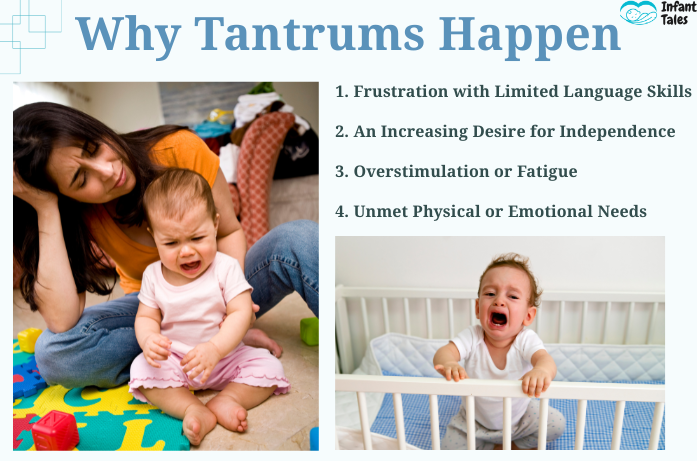By a caring mom at Infant Pamper
Toddler Tantrums represent extreme emotional manifestations in which a child could cry, scream, or pound whatever is closest to him. They are especially common with children aged 1 to 4 and are often random. However, tantrums are very much a healthy and normal part of emotional development.
At this stage, toddlers are trying to understand feelings, assert independence, and make their way around an unfamiliar world; all this, while still lacking skills of communication and emotional control to express themselves calmly. For many families, this is the stage where parents struggle with toddler tantrums the most.

Why Tantrums Happen
Knowing the reason behind a tantrum is the step to controlling the tantrum. Most tantrums arise from:
1. Frustration with Limited Language Skills
In many cases, toddlers know what they want but do not know how to ask for it. Meanwhile, if others do not understand their needs, this soon builds frustration and erupts into a tantrum.
2. An Increasing Desire for Independence
As young children develop a sense of self, they want to make choices and do things on their own. If denied for reasons of safety, time, or boundaries, they may become irritable. This is one of the most common tantrum triggers in toddlers.
3. Overstimulation or Fatigue
Noisy environments or bright lights, crowds, afternoon naps, and hunger can all cause emotional overload in one- or two-year-olds, whose nervous systems are still developing.
4. Unmet Physical or Emotional Needs
Sometimes tantrums occur when a child is tired, hungry, overstimulated, or looking for a connection with their caregiver.
For more expert insights, see Zero to Three’s guide on Toddler Tantrums, Why They Happen and What You Can Do.
Why Parents Find Tantrums So Challenging
Now while tantrums from toddlers are normal, they are truly hard situations for the parents to calmly handle. Here’s why:
Emotional Triggers: The big meltdown of the child can trigger a big parent emotional reaction: stress, anxiety, or even anger. Without the use of emotional regulation tools, the parent is likely to feel overwhelmed or helpless.
Mental and Physical Exhaustion: Most parents are in a deep state of stress: work, household responsibilities, lack of sleep. Along with a lack of energy, patience also dwindles, making it difficult to find quiet moments during times of stress.
Uncertainty and Guilt: Not all parents feel confident about how to properly respond to tantrums. The lack of clear guidance or even conflicting advice can feed into mistrust, guilt, or self-mistakes.
Public Pressure: The experience of a child having an outburst in public is a significant source of stress for parents. A primary reason is the pervasive fear of social judgment, which can lead a parent to distance themselves from their child, thereby exacerbating the initial problem.
The Brain Science Behind Tantrums
Tantrums are not manipulative. These are an undeveloped brain struggling to process big emotions.
The prefrontal cortex controls logic, self-control, and emotional regulation, and is still under construction in toddlers. Instead, the limbic system takes over, which results in huge impulsive tantrums when he is upset.
After realizing this, a parent may be able to adjust and move from frustration to pity. Your child isn’t making life hard for you; it’s the other way around.
Expert Note: According to Zero to Three, one of the leading organizations in early childhood development, helping children manage emotions begins with calm, responsive caregiving, not punishment or shame.

How to Respond to Toddler Tantrums Effectively
These tantrum tips will help you get through tantrum fairly and practically without losing your temper:
1. Stay Calm and Relaxed
Even if your child is yelling or throwing toys, your calm response helps regulate their emotions. Speak in a soft, steady tone and maintain a relaxed posture. Children often mirror your energy.
2. Maintain Eye Contact and Acknowledge Feelings
Let the child know that you support the feelings, though you can’t support the behavior. Say; “You’re really upset. I’m in here with you” to help him or her feel acknowledged and safe.
3. Hold Firm Boundaries With Kindness
Set clear, gentle limits. For example, “I won’t let you hit. I will help you calm down.” Boundaries provide emotional safety when communicated with empathy.
4. Wait Until Calm to Teach
When tantruming, the brain acts in survival mode, neither ready to listen nor to learn. Once the child becomes calm, review what has happened and teach better ways of expressing emotions.
5. Offer Comfort Without Giving In
Hold or soothe as needed if your child is seeking connection. Comforting does not mean yielding to unreasonable demands; it means assisting the child in feeling secure and loved.
Simple Ways to Prevent Tantrums
Tantrums cannot be prevented all the time, but their incidences can be minimized by anticipating the needs of your child:
- Stick to Predictable Routines: Toddlers like structure and having meals, naps, and quiet time on time. It gives a feeling of safety to them.
- Offer Choices: Providing simple choices such as, “Do you want the red cup or blue cup?” gives toddlers a feeling of control and minimization of power struggles.
- Identifying Triggers: Watch for a pattern. Are tantrums more likely when your child is tired? Hungry? Overstimulated? Getting familiar with triggers can help you plan better.
- Teach Emotional Language: Emotions are labeled very simply for the child, such as “sad,” “mad,” or “frustrated.” Labeling emotions helps to build emotional awareness and equips a child with the ability to express themselves.
When Tantrums Might Need Extra Support
Most tantrums are common and harmless. Consider seeing a pediatrician or child developmentalist if you observe that:
- Tantrums are extremely frequent, intense, or long-lasting
- The child becomes aggressive or self-injuring
- There are concerns of late speech or social development
- You are overwhelmed or feel fraught with anxiety or unsure of how to confront the situation
For further professional advice, Johns Hopkins Medicine provides guidance on When to Worry About Toddler Temper Tantrums, helping parents recognize when extra support may be needed.
What Not to Do During a Tantrum
Avoid responses that might make tantrums worse or damage trust, such as:
Yelling or threatening: Raising a voice may have a temporary effect on a tantrum, as it teaches fear instead of self-control. Children must learn best through calm serenity.
Shaming or labelling: “You’re being bad” makes a child feel rejected, not understood. It can be damaging to their self-esteem and does nothing to build their emotional skills.
Withdrawing all attention: Walking away coldly might make a toddler feel abandoned. It is alright to give a little space, but stay close by and reassure them that you will be there when they are ready.
Bribing with treats or toys: Rewarding a child for stopping a tantrum teaches them that tantrums are a way to win. It’s better to help them calm down and express their emotions in a healthy way.
For more practical guidance on coping strategies, the NCT (National Childbirth Trust) offers useful advice in their resource on Toddler Tantrums Facts and How to Cope.
Remember, toddlers are in the process of learning. Though it may stop their behavior at the moment, harsh reactions do nothing to teach them alternative ways to deal with their emotions.
FAQs About Toddler Tantrums
1. Are tantrums a sign of bad parenting?
No. Tantrums are a normal phase of development. They do not mean you are doing something wrong.
2. How long does an average tantrum last?
Most tantrums last from five to fifteen minutes, although it can feel much longer when you’re in them.
3. Should I ignore tantrums completely?
It is best to ignore the behavior but not the emotion. For instance: stay nearby; stay calm; and give your child the assurance of your presence.
4. At what age do tantrums usually stop?
Most children outgrow tantrums of more or less frequent nature by the age of 4-5 when their language and self-regulation skills have improved.
5. When should I worry about tantrums?
You may need to consider talking to your pediatrician if tantrums are longer than usual in duration, are physically aggressive, and if developmental concerns co-occur under your consideration.
Final Thoughts: You’re Doing Better Than You Think
Toddler tantrums can sometimes be overpowering, yet they stand out as one of the most natural, essential processes in early childhood. These incidences do not designate failure but are avenues to instill resilience, empathy, and bonding.
With patience, practice, and compassion, you and the child will come through the experience. One day, you will laugh at those floor-flopping tantrums.
At Infant Pamper, we are serious about helping parents with genuine advice, genuine understanding, and encouragement at every stage of the parenting journey.
Every parent face tantrum, it’s part of the journey. For more real advice and encouragement, visit Infant Tales, where we walk with you through every stage of parenting.



